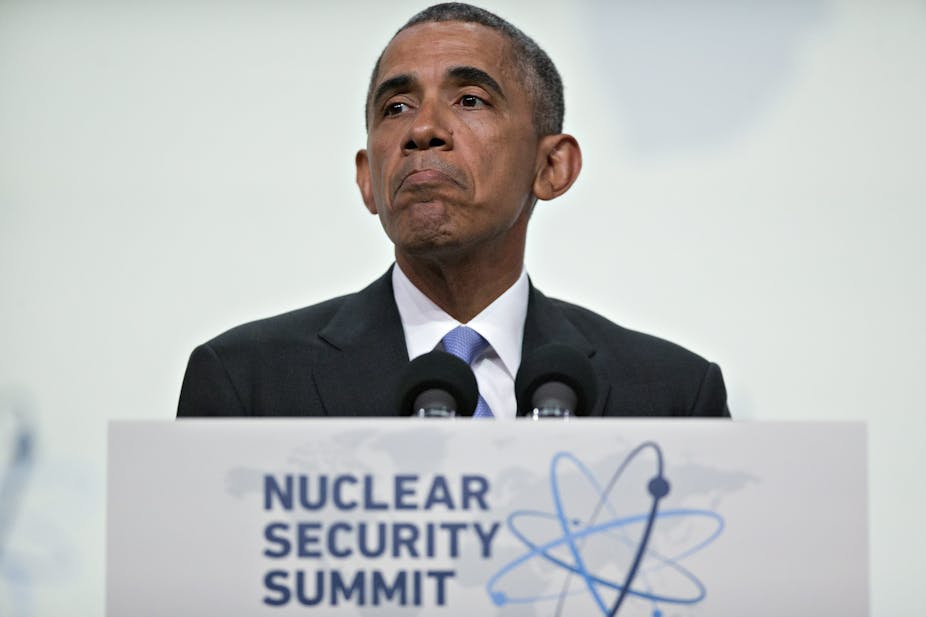Some things never change, it seems. For my entire life people have been protesting about the madness of nuclear weapons. Policymakers have been studiously ignoring such protests for just as long. Not only have the bombs remained unbanned, they have also proliferated and become bigger and “better”.
To Barack Obama’s credit, he has at least tried to do something about a threat that still puts all the others in the shade – if that’s quite the way to describe global warming.
The prospect of what is euphemistically known as “nuclear exchange” between any of the major powers may still be remote, but it is not unthinkable. The possibility of accident or miscalculation remains all too real, as do the possible consequences.
The recent Nuclear Security Summit that Obama hosted illustrated both the difficulty and the continuing necessity of achieving something. The talks were conducted against the all-too-predictable backdrop of North Korean provocation as it took the opportunity to test a new missile in defiance of US sanctions and Chinese irritation with its increasingly unpredictable ally.
In this context, the potentially valuable bilateral talks between the US and China, which might have been used to put greater pressure on North Korea, were rather overshadowed by their own unresolved problems. The increasingly fraught manoeuvring in the South China Sea has the potential to result in actual conflict – despite this being the last thing either side actually wants.
Even if this were to occur, it is still unlikely that it would escalate into a potentially suicidal all-out-nuclear clash. It is not out of the question, though. The Cuban Missile Crisis serves as a reminder of how things can potentially spiral out of control. It is hard to imagine China backing down and losing face in its own backyard even when threatened with possible nuclear annihilation.
The logic of nuclear deterrence suggests that the US is increasingly unlikely to risk such a standoff developing further. The Chinese have developed a new generation of intercontinental ballistic missiles capable of carrying multiple warheads and hitting targets anywhere in the US.
This sort of military modernisation makes the prospect of conflict less likely, the argument goes, as the US will be deterred and China will be reassured about its comparative strategic status.
Never has an acronym – MAD – for mutually assured destruction seemed more apt – to the neutral observer, at least. Some theorists of the harder-headed variety believe on this basis that proliferation will actually make the world a safer place as each country will be deterred by the prospect of their own demise.
The gun lobby in the US uses a not-dissimilar argument. We know how that’s working out.
The US itself is planning to spend an estimated $1 trillion on modernising its own nuclear arsenal over the next three decades. The Obama administration has begun a process of developing more “flexible” and smaller weapons that can be attached to cruise missiles or used to attack very specific and – in theory, at least – limited targets.
Whether potential targets will feel reassured about the logic of that development is another question, of course.
Scary and unsettling as all of this is, it is at least occurring in the world of supposedly “rational actors”. Countries, even the likes of Iran and Saudi Arabia, are too sensible and concerned about their own survival to risk triggering an apocalypse, even with their bitterest foes – or so the argument goes.
Even if that claim is true of states, it looks like wishful thinking on an epic scale to believe it of the growing numbers of non-state actors that would like to acquire a nuclear capability of some sort too. Not only is the apocalypse a seemingly welcome prospect for some religiously inspired zealots, but they don’t actually need much in the way of technical sophistication to gatecrash the nuclear club.
“Dirty bombs”, or radiological dispersal devices as the cognoscenti know them, ought to be the weapon of choice for any self-respecting suicide bomber who wants to go out with a bang. Dirty bombs potentially combine radioactive material with conventional explosives and would have a major impact if detonated in a major city.
Conventional explosives are all too easy to acquire. Given there have been literally hundreds of recorded incidents of nuclear material going missing since the end of the Cold War, it is only a question of time before the ingredients come together in deranged hands. The only surprise, perhaps, is that it hasn’t happened already.
If the seemingly inevitable does happen and our worst collective nightmare comes true, what will the response be? It is reasonable to predict that in the event of say New York being targeted again, even a cautious and cerebral figure such as Obama would unleash the full might of the American military in response.
If Donald Trump is in office, rationality is likely to be but the first of many casualties.

